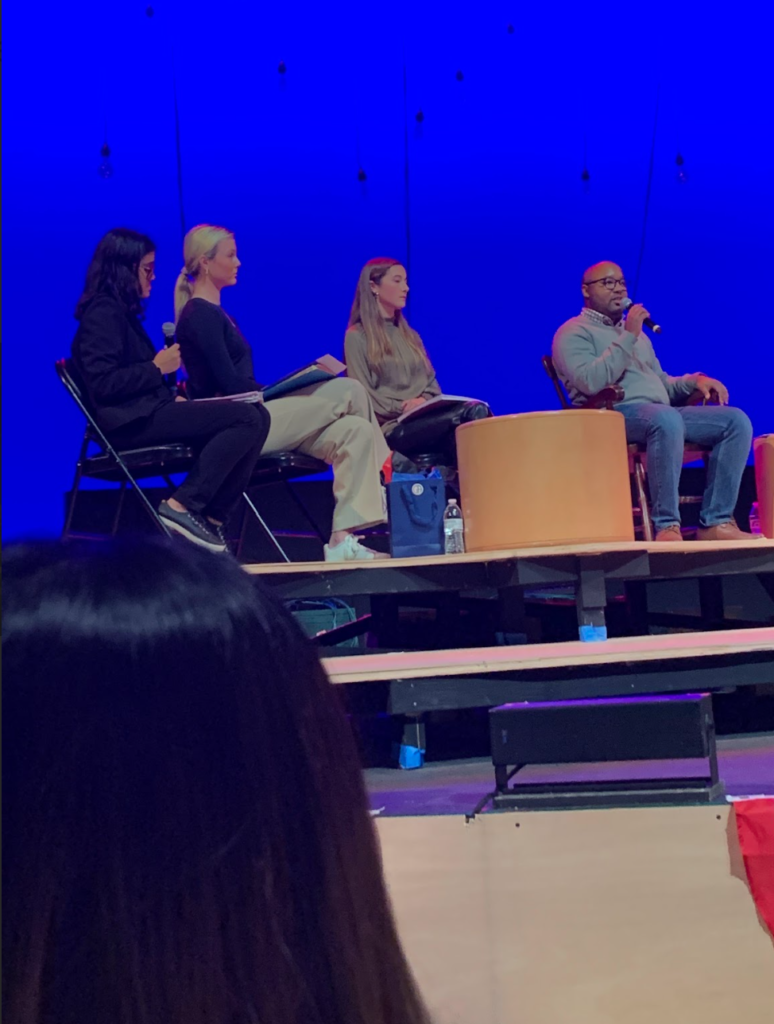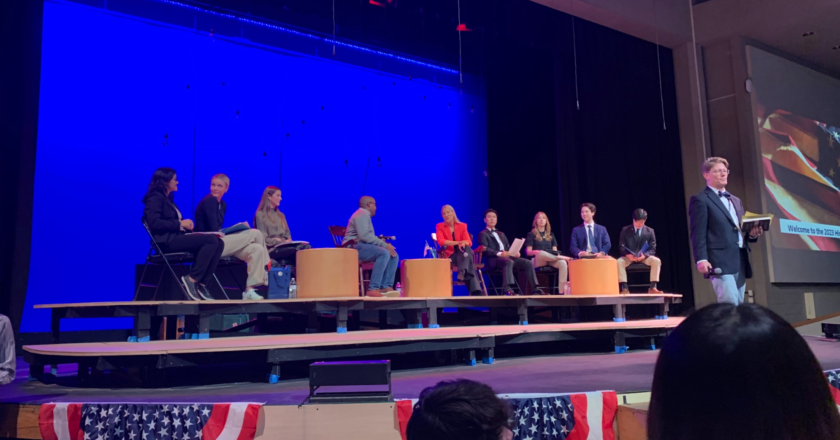On Nov. 2, students from the Power and Politics class taught by Mr. Bob Moyer, along with guest speakers Greg Scott, State Representative for Pennsylvania’s 54th District, and Ryan Manion, Township Supervisor for Doylestown Township and CEO of the Travis Manion Foundation, gathered in the Arts Center for the annual History Assembly. This year, the focus of the assembly was on the current state of American democracy.
Power and Politics students interviewed the guest speakers to discuss American democracy and its various aspects. This event provided an opportunity for GA students to learn more and reflect about the topic.
The speakers engaged the assembly by sharing their daily experiences and the challenges they encounter in their respective roles. They, collectively, expressed their deep concern regarding the divisive nature of contemporary political discourse, as well as its adverse effects on the democratic process.

Photo Courtesy of Marissa Fortunato ‘24.
Mr. Moyer first began teaching the Power and Politics class four years ago, after the shift away from the AP European History course. While developing new electives, he combined input from students with his own ideas to create the course, which is centered around students developing their own political identities.
“One of the topics that students said was really interesting and valuable to study was contemporary history of Russia and the rise of Putin,” Mr. Moyer said. “I took that idea and combined it with the idea that I felt like students should have an opportunity to study political philosophy and political ideologies more closely, and work on developing their own.”
While the History Assembly has existed for years, the Power and Politics class only recently became connected to it.
“It used to be that students would volunteer to be in the assembly,” Mr. Moyer said. “We met during lunch and after school, and that was how we put on the assembly. After the pandemic, we shifted and connected it to the class.”
“I want there to be an experience in which students truly are, in a sense, performing the exercise of a historian, which is to engage in civil debate,” Mr. Moyer said. “I think it’s important for the community to see individuals have political discussions and debates agreeing and disagreeing in ways that are productive and valuable.”
Power and Politics student Saloni Bhatia ‘24 said she has been interested in politics since around 7th grade, and her interest was strengthened by spectating past Power and Politics assemblies while in middle school.
“[The Power and Politics Assembly] would come to the middle school sometimes, before Covid,” Bhatia said. “They would do the debates and that really interested me, so when I had the opportunity to take this class, I decided to sign up for it. I’m really glad I did, because it has taught me a lot about not only American politics but also international politics.”
Mr. Moyer and his students began planning out the assembly from the beginning of the year, conducting extensive research about political ideology. The students led the planning process, with Moyer giving guidance as needed.
“These assemblies, in my personal view, are my proudest moments as a teacher,” said Mr. Moyer. “If I am doing this the way that I intend and the way that I planned, the students are really doing all of the heavy lifting. They’re doing the construction, they’re on the stage, they are the ones who are speaking.”
For Mr. Moyer, the Power and Politics class represents an important opportunity for students to develop their personal and political identities.
“I want there to be an experience in which students truly are, in a sense, performing the exercise of a historian, which is to engage in civil debate,” Mr. Moyer said. “I think it’s important for the community to see individuals have political discussions and debates agreeing and disagreeing in ways that are productive and valuable.”
Reflecting on the assembly, Mr. Moyer wasn’t surprised at the results of the poll showing low levels of trust in local, state, and especially federal governments.
“Here’s the other thing that I really wanted students to engage in and see this idea: how do we make our democracy stronger? And I hope that when people think about the assembly, they would start by saying that examples like that make our democracy stronger,” Mr. Moyer said. “Discussions about these issues are the foundation for our democratic system.”
For Bhatia, one of the main takeaways was how partisan divides shouldn’t dictate politics as a whole.
“Republicans and Democrats don’t have to be so separate. Like, I think we’re given the idea that, like, if you’re a Republican then you have to vote Republican,” Bhatia said. “Even if you feel like you support a party, you don’t have to just subject yourself to that one idea, and you can allow yourself to look at all the different parties and what they believe in.”

